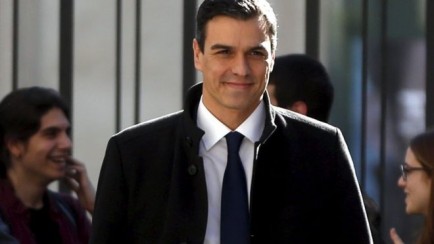
Could this man be Spain’s next Prime Minister? We will find out next week…
The political limbo that Spain has experienced since last December’s general election could soon be coming to an end following the news that the centre-right Ciudadanos (Citizens) party has backed a deal that would see it form a coalition with the Socialists, thus putting Socialist leader Pedro Sánchez in pole position to become prime minister.
Let’s back up a little. After Spain went to the polls on December 20 last year, voting revealed that no party garnered enough backing for an outright majority, meaning that the country would most likely have to form a coalition government for the first time in the post-Franco era…
The deadlock proved almost insurmountable, with many of the potential permutations ruled out on grounds of incompatibility. The Popular Party (PP), won the most votes but would have been unwilling to enter into a coalition with any of the other leading parties.
The Socialists and new upstarts Podemos were certainly eager to do a deal, but their collective votes were insufficient to garner a majority, so that too was off the table. Hence, the centre-right Ciudadanos party held sway, and while there could have been a possibility of them forming an alliance with the PP, this week’s decision by the party to back the Socialists was – among political commentators at least – the most likely outcome.
The deal was signed on Wednesday to a backdrop of applause and relief, and could well end the three months of political limbo that has paused Spain’s ambitions on the global stage.
Pedro Sánchez, the leader of the Socialists, will formally seek deputies’ support to become the Spanish Prime Minister in a vote on March 2. However, even with the seats from his own party and those of Ciudadanos, Sánchez will have nowhere near a parliamentary majority, which will make his time in office fraught with opposition – their combined 130 seats in the lower house are some way less than half of the 350 seats available.
Nevertheless, this is progress, and Sánchez is calling on representatives from Spain’s other, smaller parties to join the coalition and work towards establishing the Socialists’ five-point pact; which will seek to depoliticise the judiciary, strip senior officials of immunity in the lower courts, make it easier for citizens to propose legislative initiatives, limit prime ministers to two terms in office, and remove central government interference in regional administrations.
The party also hopes to push through other, more tangible changes, such as an increase on the minimum wage, corporate tax reforms and the introduction of a special tax on wealthy estates. Many of these reforms, however, would require the backing of the PP politicians, many of whom would likely vote against them in the Senate.
If Sánchez is to become prime minister, then either Podemos and several of the other opposition parties would have to vote yes or abstain, or – much more unlikely – the PP would have to do likewise.
So things are a little clearer, but there are still some uncertainties that remain. If Sánchez is unable to secure an absolute majority, he can aim for a simple majority on March 5. Should that second bid fail, two options will remain for Spain – either the PP can convince the Socialists and Ciudadanos to join them in a grand coalition (highly unlikely), or Spaniards go to the polls again, probably on June 26.
 en
en



 Vlaams-Nederlands
Vlaams-Nederlands
0 Comments
Leave a Comment
DISCLAIMER
The opinions and comments expressed by contributors to this Blog are theirs alone and do not necessarily reflect the views of VIVA Homes Under the Sun Ltd, any of its associated companies, or employees; nor is VIVA to be held responsible or accountable for the accuracy of any of the information supplied.
Have you got something to say?